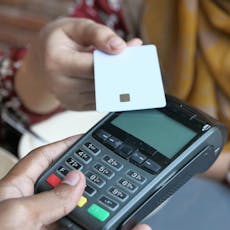A credit card is a way to borrow money and can help you spread the cost of purchases, earn rewards or build your credit history.
See which credit cards you're eligible for
Comparing won’t affect your credit score



By Matt Fernell, Editor at Finance.co.uk.

There's a lot to consider when choosing the right credit card. Here’s everything you need to know about credit cards, including what to look for to help you find the best deal.
Our eligibility checker allows you to compare credit card deals you’re likely to be accepted for - which means you can apply with confidence.
Get a decision and see deals in minutes
Only see credit cards you’re eligible for
Check eligibility with no impact on your credit score
We’ll show you credit cards from the UK’s leading providers to help find the best deal available to you.
To find the right credit card for your needs, you need to:
Enter your details: To help us check your eligibility and find the credit cards you could get, we need to know about your income, household and personal information.
Compare credit cards: See the credit card deals you are eligible for side-by-side so you can compare and choose the one that best suits your needs.
Apply online: Once you have chosen a credit card, you can apply online there and then with the provider.
A credit card is a physical card you can use to pay for your purchases online and in stores. It’s a form of short-term borrowing that allows you to buy things now and pay for them later.
Depending on the type of credit card you use, you may have to pay interest in addition to the original cost of your purchase and any pre-arranged fees.
When you get a credit card, you will be given a credit limit. This is the maximum amount of money you can borrow on the card, and the limit you’re offered will depend on your credit score, which the card provider will check during your application.
Any credit card you choose will come with an interest rate, which tells you how much interest you’ll be charged on what you borrow. You are only charged interest on an outstanding balance, so you can avoid being charged by paying off your credit card at the end of each month.
There are several options when it comes to paying off your credit card, including:
Setting up a direct debit
Transferring money via online banking
Paying over the phone
Visiting your branch
Paying by cheque
Paying by direct debit is the most convenient way and reduces the risk of missing a payment. Most banks allow you to set up a payment that will clear the balance in full, pay off a set amount (e.g. £100) or just pay the minimum amount.
Every credit card provider sets a minimum amount you must pay back each month. This must be at least 1% of your outstanding balance and any fees or charges, usually between 3 and 5% of your balance.
Some cards offer a 0% interest rate for the first few months. This means you can spread a large purchase or purchases over several months without paying any interest.
There are several types of credit cards; choosing the right one will depend on your circumstances and what you want to use it for.
Purchase cards are often offered with a 0% interest period, which means you’re borrowing for free as long as you pay the balance back in full before the period ends.
You’ll need to make sure you always make the minimum monthly payments to keep your 0% rate, and you’ll need a good credit score to be offered this type of card.
Find out more about how 0% purchase cards work here.
If you have a credit card with an outstanding balance, you can use a balance transfer to move your debt to a cheaper card.
When you get a balance transfer card, you essentially use it to pay off the balance of your existing card. Many balance transfer cards offer a 0% interest period, which means you won’t have to pay any interest on the balance for the first few months.
Most of these cards charge a balance transfer fee for you to move your debt over. Transfer fees are typically between 1 and 4% of the balance you want to transfer. For example, if the fee is 3%, it would cost £90 to move a balance of £3,000.
Here's everything you need to know about how balance transfer cards work.
These cards combine the benefits of a purchase card and a balance transfer card. This type of card can help you spread the cost of large purchases and reduce the interest you’re paying on a pre-existing card, but they often come with an annual fee.
Every time you spend with a reward card, you’ll get benefits like travel miles, cash back or discounts in shops. This type of card usually comes with an annual fee, and some charge higher interest rates. You will also typically need a good credit score to get one.
These are a good option if you always pay off your balance at the end of each month or travel and shop frequently. It’s important to determine if the rewards are worth it when considering the annual fees.
Our guide takes an in-depth look at how reward credit cards work.
If you’re heading abroad and planning on booking hotels or withdrawing cash while you’re overseas, a travel credit card could save you money. They can help to reduce the costs of using your usual credit card in another country as they don’t charge a foreign transaction fee.
Find out everything you need to know about how travel credit cards work here.
If you haven’t taken out credit before or have a low credit score, a credit builder card could help build your credit rating.
Typically, these cards have a low credit limit and high interest rates. As long as you pay your monthly bill on time and in full, you should find your credit rating improves, giving you access to better deals in the future.
If you’re new to the world of credit, these products are sometimes described as the best starter credit cards.
Here's an indepth look at how credit building credit cards work.
A money transfer card allows you to transfer money from the card into your current account as cash.
You can use this card type to clear an expensive overdraft with a high interest rate and fees. Typically, money transfer cards offer a 0% rate period, although you’ll need a good credit score to be approved, and you’ll need to pay a fee every time you make a money transfer.
Find out everything you need to know about money transfer credit cards here.
How much you can borrow on a credit card will be determined by the credit limit the provider gives you.
A credit limit is the maximum amount you can spend on your credit card. Providers set the credit limit by looking at your:
Credit score
Payment history
Income
Outgoings
You won’t know exactly what credit limit you’ll be offered until your application has been approved. However, you can usually see what cards you’re pre-approved for by using a credit card eligibility checker.
If you have a poor credit history, there are cards designed specifically to help you improve your credit score.
Credit cards for bad credit work the same way as standard credit cards, except you’re likely to come with a small credit limit, and you may pay higher interest rates.
How much your credit card will cost depends on the type of credit card you apply for, how much your credit card provider charges in interest and whether or not you repay your entire balance every month.
Some cards may charge you an annual fee simply for having the card, even if you don’t spend on it.
Most credit cards also come with fees and penalties that you could be charged for things like:
Withdrawing cash using your credit card
Using your card abroad
Missed payments
You will also be charged a fee to carry out a balance or money transfer.
The main cost you could face is in interest. However, as this is only charged on an outstanding balance, you can avoid paying interest by clearing what you owe at the end of each month or payment cycle.
There are lots of different credit cards available, so it’s worth shopping around to find the right one for you before you apply.
Here’s a checklist of what to look at when you’re looking to apply:
Some credit card offers include a 0% interest period when you first get the card. For example, you may be able to get a card with 0% on purchases for 18 months, which means you won’t be charged interest on anything you spend for this period. After this time, however, any balance on the card will incur interest charges.
When you compare cards, remember to look at how long the introductory rate lasts and the interest rate it switches to after the end of the initial period.
Some credit card deals charge a fee every year you have the card. It is usually cards that offer rewards or other benefits that charge a fee, so work out if the potential rewards outweigh the cost of the fee.
If you don’t want to pay a fee, search for credit cards with no annual fee and check the terms and conditions of a card before applying.
This is how much it will cost you in interest to borrow on your credit card. The higher the APR, the more it will cost you. If you are planning to leave a balance on your card, try to find a card with the lowest possible APR.
The average credit card interest rate in the UK is approximately 26%.
If you don’t clear the balance at the end of the month, you’ll be asked to pay what’s known as a minimum payment, which is approximately 3% of any balance due. The bigger your balance, the more your minimum payment will be.
Most credit card deals include charges for things like going over your agreed credit limit, withdrawing cash or using your card abroad.
If you’re worried you may incur one or more of these charges, check how much they will be before you apply and choose a card with the lowest fees.
To get a credit card, you’ll need to be at least 18 years old, live in the UK, and be able to prove your earnings. You can do a few things to give yourself the best chance of being accepted for new credit cards.
Register to vote: Being on the electoral roll provides credit card companies proof of your address.
Opening a bank account: A current account can help you improve your chances of acceptance. Setting up direct debits and saving money demonstrates to providers that you’re responsible financially.
Paying bills on time: Credit card providers will see you’re a lower risk to them if you pay your bills consistently on time for six months.
The easiest way to apply for a credit card is online. To do this, you’ll need to provide your:
Name and address
Employment and income
Date of birth
Nationality
Credit cards can help you to spread the cost of your purchases, sometimes without interest
They’re easy to use and accepted in most shops and outlets
They can earn you cashback and rewards for your everyday money
They are safer than cash as you can cancel your card if it is lost or stolen
Using credit cards can be a cheap way of borrowing money if you can get an interest-free credit card
Credit cards can help you to build your credit rating
Credit cards come with payment protection offered by Section 75 of the Consumer Credit Act
Extra fees for things like withdrawing cash or exceeding your credit limit can be expensive
High rates of interest if you don’t clear your balance - credit cards usually come with a higher APR than other forms of borrowing
It can be easy to overspend because the purchases you put on your credit card aren’t automatically deducted from your bank account
It could damage your credit score if you miss a payment or exceed your credit limit
The information provided does not constitute financial advice, it’s always important to do your own research to ensure a financial product is right for your circumstances. If you’re unsure you should contact an independent financial advisor.
We're on a mission to improve the finances of the nation by helping you to spend wisely and save money



We're on a mission to improve the finances of the nation by helping you to spend wisely and save money



APR is short for Annual Percentage Rate - which means the amount in interest you’ll pay on top of the amount you’ve borrowed. Any extra fees or charges are added to the loan amount before APR is calculated.
It’s a legal requirement for credit lenders to show their APR so an easy and fair comparison of interest rates can be made between lenders.
If you miss a minimum payment on your credit card, your lender will charge you a late payment fee, and you could lose any introductory offers, such as an interest-free period.
Missing a repayment will also leave a mark on your credit report, which may damage your credit score.
Yes. Unlike most other forms of credit, you should be able to make a payment on your credit card at any time, as long as you meet your minimum payment requirements.
To cancel your credit card, you need to contact your provider. Most lenders will offer a 14-day cooling-off period from when you first receive your card, and you’ll have 30 days to pay off any outstanding balance.
If you want to cancel your card after the 2-week cooling-off period, you’ll likely need to ensure you’ve paid off any outstanding balances.